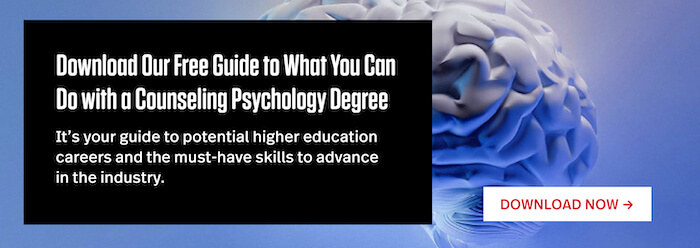Becoming a mental health counselor is an excellent way of breaking into a rewarding career that brings with it competitive pay and the satisfaction of knowing you’ve made a real difference in the lives of others. To become a licensed mental health counselor (LMHC), there are two major steps you’ll need to complete.
The first will be to complete a relevant graduate degree, such as a Master of Science in Counseling Psychology or a PhD in Counseling Psychology. Exactly which degree makes more sense for you will depend on the specific career path you wish to pursue and the role you hope to play within mental health.
The second major step is to complete your certification and receive the license that will allow you to practice in your state.
Below, we examine common counseling certifications to consider, along with specialty certifications that can potentially help you specialize within the field.
Ready to Make a Difference?
Download our free Counseling Psychology Career Guide to learn how.
Counseling Certification
When most people hear the term “counseling certification,” they are thinking of “board certification.” Board certification essentially means that you have demonstrated a mastery of the profession’s knowledge, skills, frameworks, and practices to a certifying body.
The primary certification body for mental health counselors is the National Board for Certified Counselors (NBCC), which offers two different credentials:
- National Certified Counselor (NCC): To become credentialed as a National Certified Counselor (NCC), you will need to complete the National Counselor Examination (NCE).
- Clinical Mental Health Counselor (CCMHC): To become credentialed as a Clinical Mental Health Counselor (CCMHC), you will need to complete the National Clinical Mental Health Counseling Examinations (NCMHCE).
These exams are offered and administered twice per year, once in the spring and once in the fall. To apply for and receive state licensure, you typically need to demonstrate you’ve passed the exam and received your certification.
Specialty Counseling Certifications
In addition to the two general certifications discussed above, the NBCC also offers several specialty certifications that counselors might want to consider. These specialty certifications allow counselors to demonstrate their expertise in working with a specific patient population or addressing a particular issue or condition.
Master Addictions Counselor (MAC)
The Master Addictions Counselor (MAC) certification allows a counselor to indicate that they are specialists in addiction counseling. Individuals who hold this credential are also eligible to hold the title of Substance Abuse Professional (SAP) offered through the U.S. Department of Transportation (USDOT).
To complete MAC certification, a counselor must:
- Complete a minimum of 12 hours of graduate coursework in addictions counseling. Continuing education hours (500 hours) in the area can be substituted for this requirement
- Complete a minimum of three years of supervised experience as an addictions counselor. Must include at least 20 hours per week
- Pass the Examination for Master Addictions Counselors (EMAC)
Full requirements and details can be found here.
National Certified School Counselor (NCSC)
The National Certified School Counselor (NCSC) certification allows a counselor to use the NCSC credentials, demonstrating a counselor’s proficiency in school counseling and mental health issues unique to students.
To complete the NCSC certification, a counselor must:
- Hold their National Certified Counselor (NCC) certification
- Complete coursework in at least three of the following content areas: addictions counseling; counseling for trauma, violence, and abuse; family counseling; counseling consultation and program development; counseling children, adolescents, and at-risk youth
- Complete supervised in-school field experience
- Obtain professional endorsement
Full requirements and details can be found here.
State Licensure and Titles
While state licensure is different from certification, many people discuss certification and licensure together. Typically, obtaining your license will require you to have first earned relevant board certifications.
It is important to note that licensure and titles can differ significantly from state to state, even if the role itself is similar. Check with your state licensing board to see the licensing requirements in your state. Titles can include:
- Licensed Mental Health Counselor (LMHC)
- Licensed Professional Counselor (LPC)
- Licensed Clinical Professional Counselor (LCPC)
- Licensed Professional Clinical Counselor of Mental Health (LPCC)
- Licensed Clinical Mental Health Counselor (LCMHC)
- Licensed Mental Health Practitioner (LMHP)
The First Step to Becoming a Certified Counselor
Ultimately, the first step to becoming certified and licensed so you can practice as a counselor in your state will be to complete the required education. Typically, this means earning your Master of Science in Counseling Psychology, though earning a PhD in Counseling Psychology may be a good alternative for those interested in potentially becoming a counseling psychologist.
In addition to fulfilling the educational requirements you’ll need for your license, your degree will also arm you with the knowledge, skills, frameworks, and tools that you’ll need in order to be successful throughout your career.
Jumpstart your future today and learn more about gaining the skills and experience needed to accelerate your counseling psychology career.







Related Articles
4 Pressing Global Health Problems We Face Today
Global Health Careers: How Can I Make a Difference?
Compliance Specialists: Who They Are and What They Earn